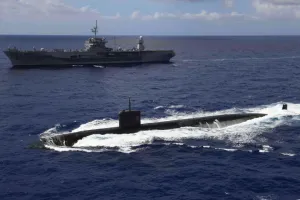Two days ago, the United States, the United Kingdom, and Australia announced the establishment of a new defensive security pact, AUKUS, the first coordinated project of which will be to assist Australia in the building of its first nuclear-powered submarines. Only six countries currently possess such vessels, with Australia being the likely seventh to join an exclusive club. The People’s Republic of China—which possesses its own nuclear-powered submarines—went unmentioned in the three Anglophone countries’ announcements, but it’s clear that the action is a response to growing Chinese military capacity in the region.
The announcement was met with a wave of controversy and criticism from news outlets and foreign governments. The largest outburst came from France, which previously had a contract to help Australia build diesel-powered submarines. That contract was scrapped for the new AUKUS deal, with apparently little warning. Nuclear-powered submarines can stay underwater for far longer than their diesel-powered counterparts and are significantly more difficult to detect.
It is plausible to interpret French dissatisfaction in two ways. One broad explanation, favored by some influential pundits, is that the snubbing of the French in favor of an exclusively Anglo pact is yet another sign of a deteriorating relationship between Europe and the United States. The UK, of course, recently left the European Union, and so apparent American prioritization of the UK could be seen as a slight. Instead of a deepening of ties between democratic countries, it could represent a tightening of the relationship between Anglophone countries.
Bill Hayton, an Associate Fellow with the Asia-Pacific Programme at the UK-based foreign policy think-tank Chatham House, offered Spectacles a narrower explanation. The deal, he says, is partly “a story of the French contractor not delivering on time and to spec, and partly it’s about the Australians redefining what they want.” For Australia, the choice between a lagging contract for dated technology and the opportunity to be at the cutting edge of maritime security is an easy one.
The French, for their part, are plausibly more irritated about a lost deal than they are about the broader status of the transatlantic relationship, though it may very well be the case that there are problems in the transatlantic alliance. For example, the EU is exploring an investment deal with China while the United States continues to trade tariffs back and forth with the People’s Republic. That said, it’s difficult to chalk up claims that the tight transatlantic relationship is on the brink of collapse to much more than media catastrophizing.
If there is a problem with the AUKUS deal, it lies in the region directly affected: Southeast Asia. While the United States conducts military exercises with and has access to some bases and ports in the nations of the region, according to Mr. Hayton, “none of those [nations] will be at a sufficiently high level to be...a strategic partner in the way the Japanese or the South Koreans or the Australians are in the region. So you have this void in terms of American security alliances in Southeast Asia.” AUKUS may be beneficial for American power projection and for Australia’s own security, but it does little to draw non-Anglo nations or regional organizations—such as the Association of Southeast Asian Nations (ASEAN)—into crucial strategic cooperation and contribution.
This problem is, at its root, non-military. China continues to dominate the regional economic arena, as well as increase its economic influence around the globe through its Belt and Road Initiative (BRI). As Mr. Hayton says, while China certainly bears some responsibility for the militarization of the region, its economic approach offers an edge over “the purely security-focused approach that the US seems only capable of.” To that point, the United States has not done enough to offer beneficial economic or development aid to the nations of Southeast Asia, while China continues its BRI projects in the region.
If the United States continues to focus solely on military solutions to its China problem, rather than competitively boosting its economic and diplomatic interdependence with Southeast Asian nations, it may find itself increasing the odds of war while shrinking its own economic power.
In the early twentieth century, it was widely believed that no major war could break out in a world so tightly bound together by trade. That was twice proven wrong. Today, some still believe it. But what is clear is that in a world bound together by the international market, defensive pacts cannot solve all problems, as the US must learn. Instead, we need to regain an awareness of the value of trade and diplomacy in building relationships.
Subscribe to Spectacles

Comments
Join the conversation